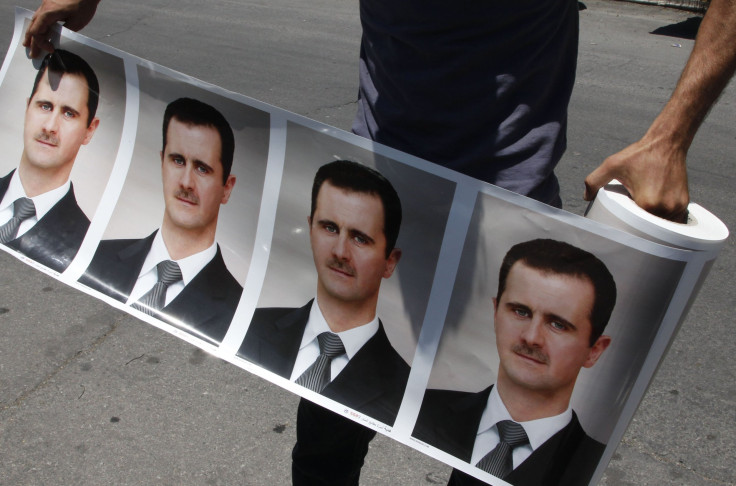Syria Civil War: Bashar Assad Has Gained Upper Hand As West Fails To Topple Him

As the foreign ministers of 11 countries convene in London to discuss ways to end the brutal civil war in Syria, an unspoken acknowledgement has framed the proceedings, and perhaps doomed them: The three-year campaign pressed by Western leaders to topple Syrian President Bashar Assad has essentially failed, with his regime now firmly in control of previously contested territory.
In what many experts take as a sign that Assad is operating with a growing sense of impunity, there is evidence that his forces recently dropped chlorine gas on civilians in communities sympathetic to the rebellion, Human Rights Watch reported. If confirmed, these attacks would be an embarrassing setback for the Obama administration, which brokered an internationally monitored arrangement, in lieu of threatened military strikes, to remove Syria's chemical weapons stockpile. Syria accepted the deal after being condemned for allegedly using chemical weapons to slaughter hundreds of civilians in a Damascus suburb last August.
Last week, after arranging a safe retreat for opposition fighters in Homs, the Syrian government regained full control over the central city for the first time since the uprising began in March 2011. And on Tuesday, after a turbulent and unsuccessful 21-month stint as the U.N.'s chief envoy for Syria, veteran diplomat Lakhdar Brahimi announced his resignation, citing his failure to achieve a solution.
No city symbolizes the direction of Syria's conflict more than Homs. Syria's third-largest city, with a prewar population exceeding 600,000, Homs became so identified with opposition to Assad that it was called the "capital of the revolution." Anti-regime sentiment first emerged there during the early days of the Arab Spring in 2011, drawing in participants throughout Syria and abroad, mimicking similar uprisings that toppled dictators in Tunisia, Egypt, Libya, and Yemen.
Initially, the opposition received significant support from the city's residents, but perceptions have shifted over the three bloody years. Anti-regime participants split into several different groups and began to fight one another. Ayman Kamel, the Middle East and North Africa director for the Eurasia Group, a political risk consultancy, said the opposition's failure to unite was costly.
"In the beginning, Syrian people were more forgiving of opposition mistakes, but within a year after the uprising began, it became clear that these mistakes weren't being addressed."
Three years of constant fighting have taken a toll on Homs' population. Much of the city has been reduced to rubble, making it impossible to regain any kind of normal life. "People here are tired of the war," Jamal Mozen, a metal worker, told the Los Angeles Times. "They've had enough."
In August 2011, when President Barack Obama and European leaders declared, "Assad must go" a resolution to the conflict seemed inevitable, and the dictator's days in power seemed numbered. U.N. Security Council resolutions authorizing force in the country have been persistently blocked by Russia and China, and Obama has been reluctant to provide lethal assistance to anti-Assad groups, some of which are Sunni Islamic extremists linked to al-Qaeda.
And as world powers remained aloof, Syria's conflict has increasingly become a proxy war between Iran, the Muslim world's most powerful Shi'a-majority state, and Sunni-ruled Saudi Arabia, allied with the Gulf sheikdoms. Using Iraqi air space, Iran has provided Assad -- a member of the Alawite sect, an offshoot of Shi'a Islam -- with economic and military assistance, outmaneuvering the comparatively impotent Saudis.
"The Saudis haven't built an effective foreign policy apparatus. They've been able to provide plenty of funding, but nothing militarily," Kamel said. "The Iranians are much more sophisticated."
The United Nations' 2012 appointment of Brahimi, a veteran Algerian diplomat, sought to bring all these players to the bargaining table. But even two high-profile summit meetings in Geneva have had little impact. And once Assad announced his intention to run for a third seven-year term in a June 3 election, the possibility that he would cede power became ever more remote.
The international community hasn't abandoned its goal to find an alternative to Assad. Foreign ministers from 11 countries met Thursday in London to discuss new ways to support the opposition. Western frustration with the trajectory of the war is acute. As the Human Rights Watch report shows, the Syrian regime still seems willing -- and able -- to use chlorine gas, months after agreeing to destroy its chemical weapons stockpile. But the chance to force Assad to compromise seems to have passed. Speaking in Washington on Tuesday, French Foreign Minister Laurent Fabius told reporters that an American air strike last year "would have changed many things."
Running for president yet again, Bashar Assad appears to be in better shape than at any point since the uprising began in 2011. The election itself will be neither free nor fair, Kamel said. But Assad's victory -- which is all but assured -- will force the international community to reckon with a new reality in Syria.
"The West will never officially support Assad's re-emergence," he said. "But we're entering an environment where they recognize that he isn't going anywhere."
© Copyright IBTimes 2024. All rights reserved.






















